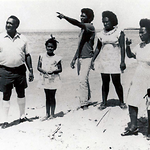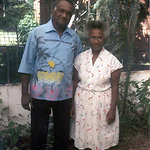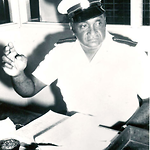Biographical entry: Fatnowna, Oliver Noel (1929 - 1991)
- Born
- 1929
- Died
- 27 February 1991
Details
The death of Oliver Noel Fatnowna on 27 February 1991, after a heart operation, was mourned by many people in both the Solomon Islands and Australia, particularly in Fataleka on Malaita and at Mackay in Queensland. Noel Fatnowna was the best known among the Australian descendants of the eighteen thousand Solomon Islanders who joined the labour trade to Queensland between 1871 and 1908. Around fifty thousand Pacific Islanders on sixty-two thousand indenture contracts were recruited to work in Queensland between 1863 and 1907, part of a wider migration of labour throughout the Pacific from the middle of the nineteenth century. About one-third of the Pacific Islanders who worked in Queensland came from the Solomon Islands and 40 percent of the labour migrants to Queensland worked at Mackay, Noel Fatnowna's hometown.
The Fatnownas are undoubtedly the major South Sea Island family in the Mackay district, by sheer numbers and prominence in the local community, and through Noel Fatnowna, in the state and nation. The Fatnowna, Bobongie, Moonie and Fiukwandi extended family, descended from the children of John Kwailiu Abelfai Fatnowna (q.v.) and Maggie Orrani (Orawani), two Malaitan immigrants from Fataleka, is one of the largest immigrant Melanesian descent groups in Australia. Noel Fatnowna was born in 1929, the son of Harry Norman Fatnowna (q.v.), and Grace Kwasi of Nggela-Buka Islands descent. Harry Fatnowna was the only son among John Kwailiu Abelfai Fatnowna and Maggie Orrani, Malaitans who first came to the Mackay district as sugar labourers in the 1890s. Kwailiu and Orrani chose to stay in Queensland, despite the pleas of Fikui, who was sent by the Rakwane people to bring John home.
Noel Fatnowna grew up at Eulberti farm on the Bucasia-Eimeo road in a rural area close to the beach. His father worked for various farmers and his mother did chores at the local primary school that their children attended. There were fourteen children; four died in early childhood and seven boys and three girls survived. Noel was the fifth child, behind Norman, Grace, Winifred and Christian, and was the elder brother of Harry, Muriel, Matthew, Charles and Valroy.
His childhood is described in his book Fragments of a Lost Heritage (1989). It was a happy time, spent in a half-traditional and a half-European life-style centred on his family's large bladey-grass houses on the farm, and on school and church, with plenty of expeditions to surrounding beaches and creeks. Perhaps most important to him were his contacts with the old Islander men and women, the original immigrants. Noel's father was a lay-preacher in the Anglican Church and later the prime mover in the introduction of Seventh-day Adventism to the Mackay Islander community in the 1920s.
At age twenty-one Noel joined the local Ambulance Service as a Bearer, preceded there by his brother Norman. For many years they were the only black Ambulance Bearers in Queensland. Noel spent forty-one years in the Service at Mackay, becoming a Senior Bearer. He was involved in fund raising and publicity for the Ambulance, which, along with work for his church, within the local South Sea Islander and Aboriginal and Torres Strait Islander community, and as a historian, made him as well known as anyone in the district. At a state level, he was long an advisor to the Queensland Government regarding indigenous health matters, and he was Commissioner for Pacific Islanders from 1977 to 1983.
In 1975, Noel followed the leads of his cousins Willie and Henry Bobongie and took his family to the Solomon Islands. Since then there has been almost constant travel between Malaita and Mackay, and several intermarriages. Noel Fatnowna was the prime mover in re-establishing links between the two places. His remarkable book, Fragments of a Lost Heritage (1989), written with Roger Keesing, tells the story of reuniting his family and of his childhood in Mackay. In 1985 Clive Moore published Kanaka: A History of Melanesian Mackay, which covers much the same ground from a more academic perspective.
Noel was always in his element in front of the public, never more so than in May 1988, when twenty-two Malaitans led by John Maetia Kaliuae, then Minister for Post and Communications, took part in a re-enactment of the first arrival of the Islanders at Mackay in 1867. Noel masterminded the event on the banks of the Pioneer River where his grandparents first waded ashore so long ago. The re-enactment was an emotional time for all, none more so than for one of the visitors, Ella Kaliuae, mother of John Maetia, and granddaughter of Fikui and Tangufoa of Rakwane, the same Fikui sent to search for Kwailiu and Orrani a century before. Noel married Minnie Choppy and they had six children Lynsay Fatnahoona, Olivene, Charles, Lloma, Shirley and Runhoa. Minnie died in June 2012. (Moore 2000a, 2004b)
Related entries
Published resources
Books
- Fatnowna, Noel, Fragments of a Lost Heritage, Roger Keesing, Angus and Robertson, Sydney, 1989. Details
- Moore, Clive, Kanaka: A History of Melanesian Mackay, Institute of Papua New Guinea Studies and the University of Papua and New Guinea Press, Port Moresby, 1985. Details
- Moore, Clive, Happy Isles in Crisis: The Historical Causes for a Failing State in Solomon Islands, 1998-2004, Asia Pacific Press, Canberra, 2004b, ix, 265 pp. Details
Journal Articles
- Moore, Clive, ''Good-bye, Queensland, Good-bye, White Australia; Good-bye Christians': Australia's South Sea Islander Community and Deportation, 1901-1908', The New Federalist, no. 4, December, pp. 22-29. Details
Images

- Title
- Noel and Minnie Fanowna and family on their first visit to Honiara, 1976
- Type
- Image
- Date
- 1976
- Source
- JCU

